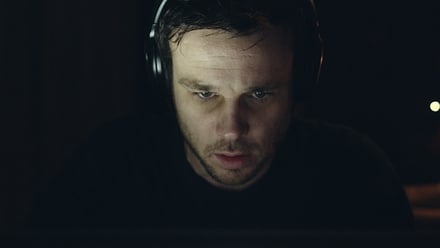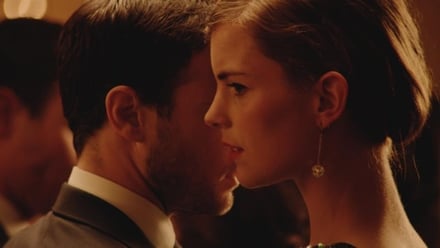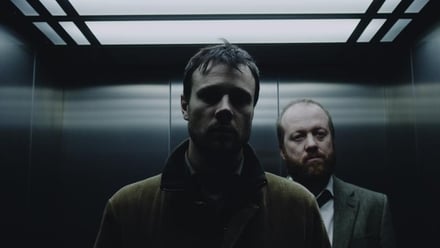With his new Irish horror The Canal out now in cinemas, writer-director Ivan Kavanagh tells TEN's Harry Guerin about bringing the scares to the screen.
The Canal stars Rupert Evans (Hellboy), Hannah Hoekstra (Hemel), Antonia Campbell-Hughes (Albert Nobbs, Kelly + Victor) and Steve Oram (Sightseers).
It tells the story of a couple and their child who move into an old house, where suspicions and nightmarish visions ensue.
Harry Guerin: What triggered the premise for The Canal - an old photo, a house move, a walk along the banks of the Grand or something else?
Ivan Kavanagh: More than anything, it was the urge to get back to the horror genre. I had made another horror film called Tin Can Man back in 2007 and loved the creative freedom of it. Good horror films, for me, resemble nightmares or dreams, and in nightmares and dreams anything goes - there are no rules or boundaries. And so, as a filmmaker, I love that I can push the sound, imagery, editing, acting way out there, almost to breaking point.
Audiences, I find, will accept very experimental techniques in this genre, much more so than they would in other genres. Again, I think it's because of the nightmare/dream element. I also wanted to make a love letter to some of the films that terrified me as a child, to make a film that was almost self-aware in regards to it being a horror film. The best protagonist for this, I thought, would be a cinema archivist, a man who has probably seen every horror film ever made. I thought his dreams and nightmares would be suffused with the films he had seen in the past, so he effectively steps into his own personal horror film.
Was it heavy going for you writing the story and did you find it upsetting you on occasion?
No. Creativity, for me, is always something joyous. Even when I was writing a very personal film like The Fading Light, which is about something very dark and real, I found the creative process itself to be positive, exciting and fulfilling. And, in the case of The Fading Light, even cathartic.
You're very intent on wrong-footing the viewer throughout The Canal - where they're not sure quite what they saw a few seconds before. How hard was that to achieve visually?
This was something I wanted to do from the beginning: to create doubt in the viewers' minds whether what David, our main protagonist, is experiencing, is real or imagined, and also to put the viewer firmly inside his head, so we see absolutely everything from his point of view. This was a very delicate balance to achieve and we did it right through the creative process, from the writing to the shooting and especially in the editing.
Robin Hill [the editor] and I experimented endlessly with these sequences, and we tried and tested them with random viewers. We knew we struck the right balance when at the end of the film every viewer seemed to have their own interpretation of what happened. I have heard so many theories about the ending of the film, especially.

What have audiences told you troubled them most watching the film - the use of sound, the black and white footage, the loss of grip on reality?
I think it's a combination of all of those elements. With The Canal I wanted to create a film that was highly visceral, where the sound and imagery were of equal importance, which is why we spent so many months creating the highly complex sound design, and which has had such a terrifying impact on audiences all around the world.
After its world premiere at the TriBeCa Film Festival in New York last year The Canal was picked up for US distribution. Tell us about your adventures with the film across the Atlantic.
TriBeCa was amazing. The audiences were so openly enthusiastic about the film, much more so than any other festival I'd ever been to. Then, the day after the film screened, I heard a "bidding war" had begun for the film, which felt totally surreal but amazing, having just come out of this very isolated world of intensive post-production on the film. You're never quite sure how an audience is going to respond to your film, but the response in America and around the world has been incredible.

What's the biggest lesson The Canal has taught you?
That the problems on larger budgeted films are exactly the same for me as a director as those on films with tiny budgets - provided I am concentrating on the important creative problems, like the acting, the lighting, production design, composition of shots etc.
Why do you think Irish horror is such a young genre?
In comparison to other nations - like Germany, France, the US etc - we are new to cinema in general, I think. There have, of course, been a number of interesting and even great films made here over the last 100 years or so, but we just don't have the same wealth of cinema history as these other countries. Probably because the money wasn't here to make the films and we have more of a literary tradition than a visual one, I think.
But something changed during the 1990s when the digital revolution happened. Suddenly cameras and editing equipment were available to just about everyone at a very low cost, including myself. This occurred at the same time as the generation who grew up watching rentals from video stores began to make films - a very visual generation - and it has flourished from there. I think it is a very exciting time for Irish cinema, and I'm dying to see what happens next.

What film from down through the years unnerved you the most - and why?
There's been so many. The ones that affected me the most are the ones that I watched at a very young age, like Bergman's Cries and Whispers, Polanski's Rosemary's Baby and Robert Wise's The Haunting. I saw Bob Clark's underrated film Black Christmas too when I was about 10-years-old and that absolutely terrified me. What it has in common with all of those other films, I now realise, is their brilliant use of sound, in conjunction with the startling imagery, which obviously must have snuck into my subconscious somehow. And to bring it full circle, Patrick Drummond, the supervising sound editor on The Canal, also worked on the sound team for Black Christmas back in 1974.
What's next for you, film-wise?
I'm currently writing a TV series for a US network. I'm also working on another psychological horror film which will be produced by AnneMarie Naughton, who produced The Canal. And I've been offered a few films to direct in the US too. So there's a lot going on.

